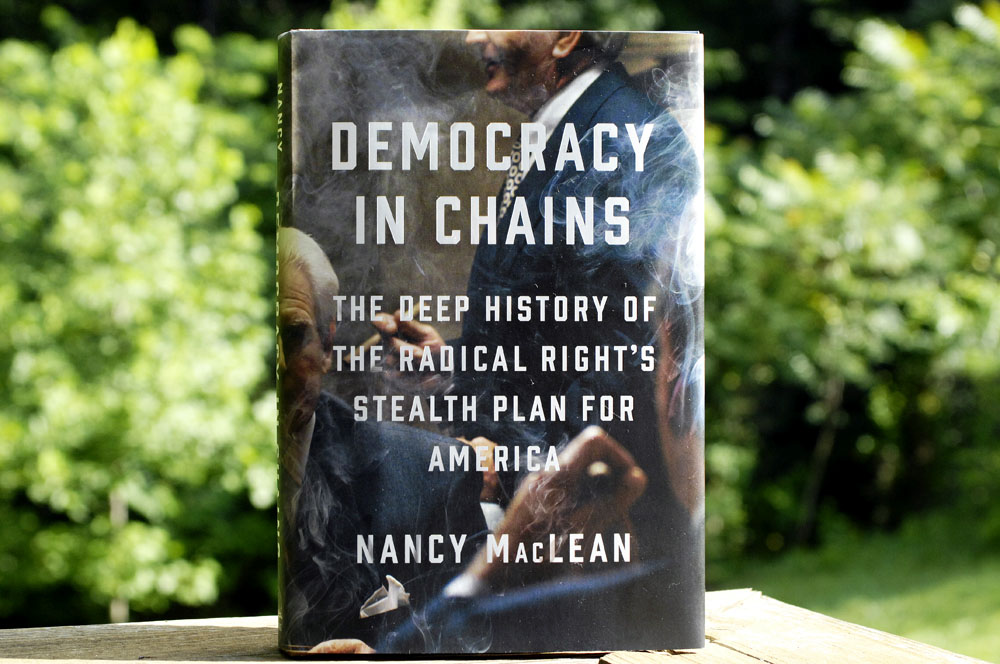Democracy in Chains: The Deep History of the Radical Right’s Stealth Plan for America, by Nancy MacLean. Viking, released June 13, 2017, 368 pages.
This book has been out for just over two weeks, but already there are 65 Amazon reviews. With the exception of one 2-star rating, all the ratings are either 5 stars (60 percent) or 1 star (37 percent). The 1-star reviews all cite pretty much the same talking points — that the book is intellectually dishonest, takes quotes out of context, contains inaccuracies, and that it’s a left-wing hit piece on libertarianism and one of the saints of libertarianism, James McGill Buchanan. In addition to the reviews, there many comments on many of the reviews, in which a war is raging.
The author, Nancy MacLean, is the William H. Chafe professor of history and public policy at Duke University. Libertarians can quibble over her quotes all they want, and they can say that we snowflake liberals are subject to “confirmation bias” (though libertarians never are, of course!). Nevertheless, whether I am subject to liberal confirmation bias or not, it seems clear to me that MacLean has landed what ought to be a finishing blow on the libertarian movement. It’s not that we didn’t already know what the libertarian movement is up to. It’s that MacLean’s research takes us much deeper into libertarian history and tears off the disguises of libertarian secretiveness.
MacLean begins her history with John C. Calhoun of South Carolina (1782-1850). Calhoun believed that slavery was a “positive good” that benefited both slaves and slave owners. He believed that individual human rights had to be “earned” (by becoming rich, for example) and that such rights were not bestowed by God or by mere citizenship. Calhoun clearly believed that owning other human beings was just one of his liberties, which presumably he earned by becoming rich. Calhoun was very jealous of these liberties earned by rich people, and there were pretty much no limits to his willingness to abridge the liberties of others — by force, by law, or by perversion of the Constitution) if the majority sought to constrain the power of the rich minority, even if what the rich minority wanted was to own other human beings.
MacLean picks up the Calhoun thread in the 20th Century in Virginia, with Harry Flood Byrd Sr. (1887-1966), who was a Virginia senator from 1933 until 1965. Byrd was a segregationist. He built a powerful political machine that worked for decades to try to keep Virginia segregated. Now what do you suppose Byrd’s theory of government and attitude to the Constitution might have been?
MacLean then turns to James McGill Buchanan (1919-2013). Libertarians know who Buchanan is, because they worship him. Part of the gap that MacLean is trying to close is to let the rest of us know who McGill was. Charles Koch, the second richest billionaire in America, who unfortunately has untold millions of dollars to pour into the project and the many institutions that carry water for him, helped make Buchanan’s career and helped finance the well-funded system which is using Buchanan’s strategies to make the rich richer (no regulation and no taxation), to destroy the social safety net, and to rig the rules so that rich men will have a lock on American government at every level, from now on.


My econ degree is from a pro-free market program in the south, where many pro-free market programs exist (similar in tone to Tulane, Rice, Auburn, Clemson, Loyola) and interestingly, the professor for whom I had the most respect was the most “Keynesian” (or pro-government spending) friendly of the bunch, as labeled by another professor. He taught upper-level macro courses and more technical micro courses, so he was better equipped as an economist than the others.
Each of them was well aware that the “road to serfdom” as Hayek called it hadn’t laid much asphalt since The New Deal put ‘Murica down the path to socialism. Buchanan was a professor at George Mason, where three of my professors received their Ph.Ds, but I didn’t realize he was popular enough to be considered a target for liberal authors as his public choice theory is a dumpster baby of an economic concept. I think he’s more guilty by association but I should probably read the book to make that determination.
I see modern libertarianism as the undercurrent that props up some right-wing efforts, but in reality, I don’t think many of the economists at George Mason have had much to do with the Kochs or the GOP outside of internet comment threads and their school of economic thought, the “Austrian” school is easily annihilated with a few numbers. The Institute for Humane Studies there gets Koch funding, as the school does I imagine, but I don’t think their influence through the school leads to this incarnation of the GOP.
The intellectualism of academic economics of any school of thought flies way of the heads of most conservatives, and those that try to use its language inevitably fall into the same tropes as always.
Dan: If you read this book, I would love to hear your thoughts…